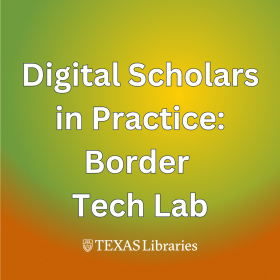
The Digital Scholars in Practice Series (DSIP) highlights the work of scholars conducting research through digital technologies and critically examining digital technologies in practice. This session’s lecture, “Computational Afterlives: Montopolis Integrated Circuits, and the Making of US Modernity,” features researchers from the Border Tech Lab, led by UT Austin faculty, Dr. Iván Chaar López (American Studies).
Integrated circuits (ICs) are critical artifacts in the historical development of electronic computing. Photoengraved into silicon, ICs made possible the miniaturization of computational hardware and sustained logics of efficiency for the computer industry since their invention in the late 1950s. ICs continue to embody visions of modernity once expressed in 1975 by Fairchild Camera & Instrument Corporation: they represent “a solid state of progress.” Graphics processing units today, integral for parallel processing by machine learning algorithms and the training of AI models, are contemporary expressions of the sociotechnical revolution associated with the IC. And while Silicon Valley often garners most of the attention in the history of computing, we argue Texas has been a fundamental site for the making of computing and its visions of modernity.
The neighborhood of Montopolis in Austin has housed multiple IC operations since 1988, from the cooperative efforts of SEMATECH to the fabless arrangements of Advanced Micro Devices (AMD). Located next to the Colorado River, Montopolis sits within the Blackland Prairies where Indigenous peoples, Spanish and Anglo settlers, enslaved and freed Black peoples, and an agricultural Mexican workforce made their lives. “Computational Afterlives” examines the kind of terrain between life and death that computing affords by rendering space and that which it holds together as valuable, usable, and disposable. It asks how Montopolis’ role as a semiconductor manufacturing node sheds light on the technoliberal values embedded in the US tech industry? The project examines archival materials from US semiconductor companies (e.g., Fairchild Semiconductor, SEMATECH, Intel), US and Texas government agencies, and popular press to understand how computing constitutes a border technopolitical regime in the organization of space, time, and peoples.
Pizza provided! 🍕 Registration required, so sign up today!
Presenters: Claire Fitch, Doctoral Candidate, Department of Geography; Crys Zhao, Doctoral Student, Department of American Studies
Location: Perry-Castañeda Library Scholars Lab, Data Lab (PCL 2.202)

